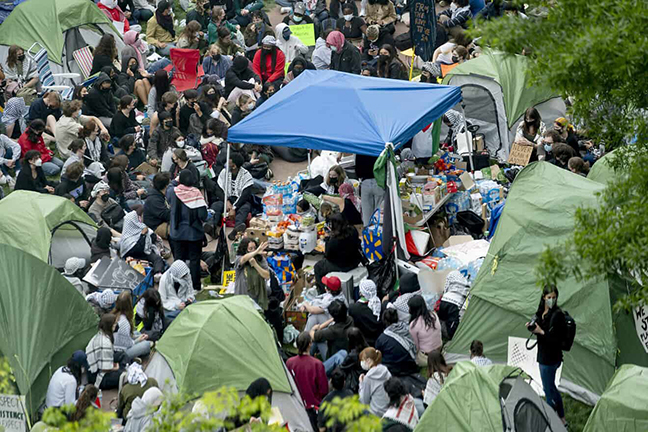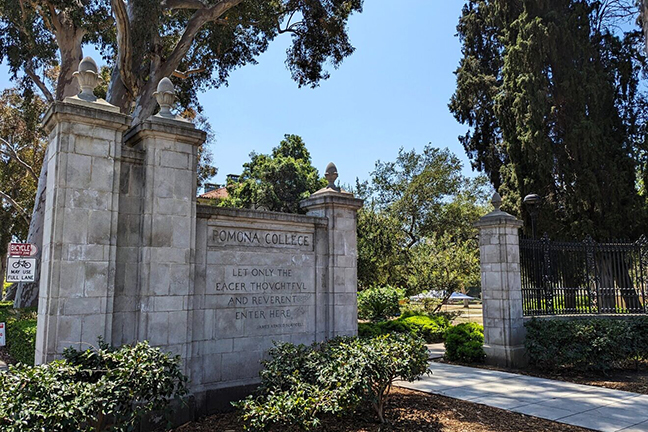Anti-Israel activism evidence of educational rot at University of Michigan

Sports fans exit Michigan Stadium after a University of Michigan football game on Sept. 4, 2021. Credit: Chad Robertson Media/Shutterstock.
by Marc Shapiro
(JNS) — With all the anti-Israel and antisemitic chaos at American universities, some may be surprised that we have not heard more about the University of Michigan. It is certainly welcome news that the situation there is not as dire as we have seen at other universities, but that does not mean the institution does not have serious problems.
For example, in March, pro-Palestinian protesters disrupted the university’s honors convocation during president Santa Ono’s remarks. One would have hoped, especially with parents in the audience, that campus police would have removed the protesters and the event concluded as planned. But in a classic example of cowardice in academic leadership, president Ono cut short his remarks and ended the event. This handed the protesters a victory in their continuing war to shut down events they don’t like.
There is a long list of such canceled events. This one was significant, however, because the university president was in attendance. Therefore, the buck stops with him and he must be given an F for lacking the courage to control the rowdy students. To Ono’s credit, after this embarrassing episode he proposed a new “disruptive activity policy” that promises real punishments for students (and faculty) who interrupt university events.
We will have to wait and see if the policy is actually adopted and, if it is, whether there will be any teeth in it. The university, after all, already has the ability to punish students for disruptive behavior and chose not to. What good is yet another policy if it is not enforced?
Michigan has seen more than disruption of university events, however. The rot has spread into classrooms, the heart of any university. It is hardly news that radicals use their courses to indoctrinate students in anti-Israel ideology. They do not explicitly admit this only because it would run counter to university requirements that professors show impartiality on hot-button issues.
Things are changing at Michigan, however. For example, last week a so-called “strike” for Gaza took place. A story in The Michigan Daily reported that an art course moved its class to Michigan’s main open space so as to be part of the strike.
We may ask: What about the students who did not want to show solidarity with the anti-Israel protest? Putting them in such an uncomfortable situation is the exact opposite of providing a “safe space.”
There is also Prof. Yarden Katz of the Department of American Culture. His University of Michigan website states that among his fields of study are imperialism, white supremacy, racial capitalism and radical social movements. Just below his profile are the slogans “Stop the Genocide!” and “Free Palestine, from the River to the Sea.”
Had these abhorrent slogans appeared on Katz’s personal website, there would be nothing to write about. On the university website, they are appalling. Would the university allow, for example, anti-LGBTQ statements or anti-Biden statements on its website? Obviously not. We all know the university would rightly insist that its websites cannot be used to advance one’s political agenda.
For years now, Katz has engaged in vicious demonization of both the State of Israel and Israelis. In Nov. 2023, he wrote, “Anyone wishing to understand how the Holocaust was possible, how people who may be warm and kind in their personal lives could support the murder of an entire population deemed subhuman, should examine Israeli society.”
This blood libel is in keeping with Katz’s fall 2024 course “Towards Liberation: How Do Social Movements Build a World Without Racism, Capitalism, and Patriarchy.” The description reads: “This is a writing course that approaches liberation from an anti-capitalist, anti-racist and anti-zionist perspective. What does liberation from oppression and exploitation mean? How can it be achieved and how might past efforts inform present struggles for liberation? We will explore how radical social movements, past and present, have envisioned liberation and fought for a world without racism, capitalism and patriarchy. Topics include: strategies for dismantling oppressive systems; the creation of alternative, non-capitalist ways of living; the cultivation of solidarity across struggles; and the problems of co-optation and suppression of radical movements.
“We won’t systematically review the histories of these social movements, but rather use materials from these movements to stimulate our own thinking about liberation. Each week we will write about one aspect of liberation and give each other constructive feedback, so that we can grow as writers and thinkers.”
We can only wonder how such a course, which is obviously intended not to educate but indoctrinate, could ever have been approved by the university.
It is significant that, in the very first sentence of the description, we are told that the course operates from an “anti-zionist” perspective. Even radical anti-Zionist professors used to feel they had to put up a veneer of impartiality. Yes, they could push an anti-Zionist narrative, but their course descriptions would speak about “analyzing” the Zionist movement and its opponents.
Katz and the University of Michigan have thrown this out the window. The message to Zionists — the overwhelming majority of Jews and many non-Jews — is that they are not welcome in class unless they are willing to adopt Katz’s anti-Israel ideology. Can anyone imagine the university approving a course based on an anti-Palestinian, anti-Democrat or even anti-Republican perspective?
I posed this question and a number of others to the University of Michigan’s Office of Public Affairs. They declined to comment. The question we must ask is how we got to a place where the University of Michigan is now willing to allow its academic courses to be hijacked for anti-Zionist and other radical political agendas.
Marc B. Shapiro is the Weinberg Chair of Judaic Studies at the University of Scranton.



